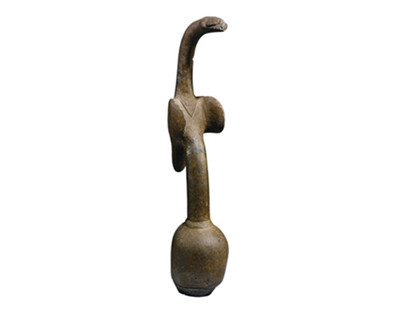So we went for the difficult food, we went for things like the small hard grass seeds we call cereals, that are indigestible if eaten raw and may even be poisonous, and we have to pulp them up and turn them into things like bread and dough. And we went into the poisonous giant tubers, like the yam and the taro, which also had to be leeched, ground up and cooked before we could eat them. And that was our competitive advantage - other animals that didn't have the big brain couldn't think several steps ahead to do that.'
因此我們另開蹊徑,去尋找那些要獲取的話,相當困難的食物。我們尋找到了那種被我們稱之為谷物的草籽,又小又硬,生吃的話,肯定消化不了,甚至可以有毒性;于是我們學會了把它們浸泡成漿,再做成類似面包或面團之類的東西。我們也尋找到了那些帶有毒性的、個頭頗大的塊莖,像山藥、芋頭,這些在食用之前得經過榨取、提煉和烹飪。這就是我們人類的競爭優勢,其他動物可沒有具備像我們這么發達的大腦,能夠有預見性,超前跳躍式的進行思考。”
So it takes brains to get to cookery. We don't know what gender the cooks were who used our pestle to grind taro in New Guinea, but we do know from archaeological research in the Middle East that cookery there was primarily a woman's activity.
所以烹飪也是需要動腦筋的。我們無法知道這根使用舂杵的廚師性別是男是女,但中東地區的考古成果顯示通常烹飪是女性主導的。
From examining burial sites of this period, scientists have discovered that the hips, ankles and knees of mature women are generally severely worn - the grinding of wheat then would have been done kneeling down, rocking back and forth to crush the kernels between two heavy stones.
通過研究這一時期的墓葬遺址,科學家們發現成年女性的臀部、腳踝與膝蓋部位嚴重磨損——那時研磨小麥,通常需要雙膝下跪、利用前后兩塊沉重石頭來回滾動,反復研磨,直到把谷物碾碎。
This arthritis-inducing activity must have been very tough, but the women of the Middle East and the new cooks everywhere were cultivating a small range of nourishing basic foods that could sustain much larger groups of people than had been possible before. Most of these new foods were pretty bland, but the pestle and mortar can also play a key part here in making them more interesting. Madhur Jaffrey again:
這種活動會導致關節炎,肯定是相當艱苦的。不過中東這些婦女與世界其他地區的新廚師們正在培育出一種最基本的滋補食品,品種雖少,卻可以養活史無前例龐大數目的人口。這種新型食品大部分嚼之無味,但是這研缽與舂杵卻很關鍵使一切變得更加豐富有趣。梅赫爾·杰弗瑞再次說道。
'If you take mustard seeds, which were known in ancient times, if you leave them whole they have one taste, but if you crush them, they're like Jekyll and Hyde; they become pungent and bitter, so you change the very nature of a seasoning by crushing it.'
“比如芥菜籽吧,遠古時代的人類認識它了。如果整顆的話,嘗起來是一種味道;而如果碾碎了,就像是‘變身博士’了,它的味道就變得辛辣、苦澀。因此你可以通過碾磨來從本質上改變一種調料。”
And Martin Jones believes that in due course, this early farming changed the whole pattern of our society:
馬丁·瓊斯認為,這種早期農耕形式最終順理成章地改變了我們的社會模式:
'We specialise in those smaller number of foods - not stopping the others - but emphasising a smaller number of foods, and that's how agriculture emerges, and it allows people to interact in different ways, to share food in different ways and to make contact with each other in different ways.'
“現在我們專注于品種較少的食物,沒有停止食用其他種類,但卻更注重于若干種類的食物;于是產生了農業,促使人類互動的方式多樣化起來,來分享食物,來與彼此交流溝通。”
These new crops helped create new kinds of communities because, if you were lucky with the weather, they could produce surpluses which could then be stored, exchanged or simply consumed in a great feast. Our pestle's long, thin elegant body looks far too delicate to have been able to withstand the vigorous daily pummelling of taro, so we should perhaps think of it more as being used to prepare special meals; meals where people gathered, as we might do today, to trade, to dance, or to celebrate key moments in life. Sharing food is one of the most basic ways of binding people together.
這些新興農作物有助于人類社區的建立,因為假如你運氣夠好,遇上風調雨順的氣候,收成好了,就可以囤存余糧,就可以彼此交換,或者直接大家聚一起大快朵頤,飽餐一頓。我們這根舂杵纖長優雅的身形,看上去似乎承受不了常日生活里大力碾磨芋頭那種粗活苦活,也許我們應該把它看作來用準備特殊膳食的,一場人們歡聚一堂的盛宴,就像我們今天也可能做的一樣。盛宴上大家進行物物交換,歡歌樂舞,慶祝生命中的關鍵時刻。分享食物是鞏固人與人之間紐帶的一種最基本方法之一。












